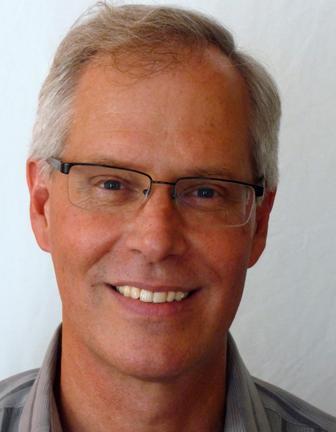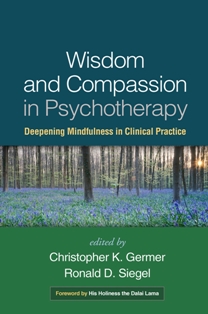Every now and then, you meet someone who changes your world. For me, that most recent someone is a remarkably wise and compassionate colleague, Christopher Germer. Germer is a Harvard Medical School Clinical Instructor in Psychology and a founding member of the Institute for Meditation and Psychotherapy, a non-profit organization dedicated to the education and training of mental health professionals interested in integrating mindfulness meditation and psychotherapy.

Truthfully, Germer is more than a colleague, he's a mentor. The good psychologist not only ignited my interest in all things self-compassionate, he re-ignited my passion for book-writing. He's got that kind of inspirational effect on people.
Germer's got a new book out, Wisdom and Compassion in Psychotherapy, which he co-edited with psychologist Ronald Siegel. This edited anthology was inspired by none other than the Dalai Lama and Harvard's 2009 Meditation and Psychotherapy Conference, which His Holiness graced on Germer and Siegel's invitation. In this densely rich volume, mindfulness-oriented therapists, meditation scholars and scientists aim to answer an ambitious question: How can therapists cultivate wisdom and compassion in themselves and their clients?
This 407-page anthology will never be a New York Times bestseller. It's just not that kind of book. While it contains invaluable lessons for nonprofessionals, it's geared to professionals. Which is why I recently asked Germer to take a break from his whirlwind lecture and teaching schedule to share lessons learned from the Dalai Lama and Wisdom and Compassion's other contributors. What follows are questions and answers from that illuminating phone conversation.

Q. Compassion and wisdom. What's your best working definition of each?
A. Wisdom is knowing deeply how to live well. Compassion is the experience of suffering with the wish to alleviate it. The experience may be one's own suffering and the wish to alleviate; that's self-compassion. Or it may be the experience of suffering of others and the wish to alleviate it. [In either case], compassion is when love meets suffering, but remains loving. Usually what happens when love meets suffering is the love goes out window and we all start to struggle with it.
Q. The term you use for compassion without wisdom is "idiot compassion." What do you mean by that?
A. That's a Tibetan expression, which some people find rather uncompassionate. [He chuckles.] What it means is behaving in a soft and accommodating way when taking a stronger position is called for. When somebody is harming another, and you just feel sympathy for their struggle as a human being, and you don't stop the harm, that's idiot compassion. The most compassionate thing to do for both the victim and perpetrator is to stop the harm that's being done.
Q. Tell me about an important lesson you learned from the Dalai Lama.
A. When I asked about self-compassion, he said that even when people are harsh with themselves, they are expecting something good to come out of it. He was articulating the Tibetan frame of reference that all living beings are born with the wish to be happy and free from suffering. Even when we're harsh and critical with ourselves, we believe in a mistaken way that this will lead to us being happier and free from suffering. That's half of it. The other half is if we're all born with the wish to be happy and free from suffering, then self-compassion practice, which is the cultivation of good will or good intention, is actually nothing other than activating the deepest intention that all living beings are born with.
Q. I know that self-compassion can be cultivated, but what about wisdom?
A. Mindfulness meditation, which is the practice of looking without assumptions at moment to moment experience, is the royal road to wisdom. Basically, by looking in, we learn the nature of things, and out of that arises wisdom.
Q. Do you have a favorite practice that cultivates both wisdom and compassion?
A. That is the practice of loving-awareness. Many people misunderstand mindfulness as an awareness practice. The irony is that you cannot be aware unless the quality of awareness is loving. Actually, when mindfulness is in full bloom, it is indistinguishable from love. And when love is in full bloom, we are fully mindful. However, in the beginning, when we're starting to practice, we're usually not able to do all this at the same time. It's the same as learning how to ski in difficult terrain. We take one piece, we take another piece, we put them all together, and eventually ski through the bumps and trees.
Q. People assume that therapists are inherently wise and compassionate, but you caution against that assumption. Why's that?
A. What I'm saying is that therapists can have an abundance of compassion but less wisdom. Or an abundance of wisdom but less compassion. If we have an abundance of wisdom but less compassion, we can understand a patient, but we may not actually be able to feel or resonate with their suffering. If we have an abundance of compassion but less wisdom, we could be feeling together, but not have any way of transforming their suffering. What we really want is a combination of insight and a warm-hearted empathy. Our patients really deserve both.
Q. For readers who are looking for a new therapist, do you have any shopping tips for finding one that possesses wisdom and compassion?
A. When people shop for a therapist, they usually follow their gut. I would say that if they feel both connected (not alone), and they feel the therapist has at least a preliminary grasp of the problem, they probably have a person with some measure of wisdom and compassion.
Q. Anything else I didn't ask that you might want to add?
A. One of the main things to bear in mind is that the agenda of mindfulness is not mindfulness for its own sake. It's for the alleviation of suffering. And that mindfulness, when it's in full bloom, has the qualities of wisdom and compassion. It's actually the wisdom and compassion that alleviates suffering.
The second thing is when we practice mindfulness and compassion, particularly self-compassion, there are short- and long-term goals. The long-term goal is to alleviate suffering. But, moment to moment, we have to abandon that goal and learn to give ourselves kindness and not feel better, just because we feel bad. In other words, like a child who has a five-day flu. The parents are not going to berate the child and expect that the flu will go away, which is what we do when we begin to feel bad. Rather, we give the child care and comfort, knowing that the flu will not go away immediately. Can we treat ourselves the same way? Can we give ourselves compassion just because we feel bad, just as we would do for a beloved friend or a child? The answer is we can, and we can learn it.
One last thing: Kristin Neff and I have developed this eight-week mindfulness self-compassion training program. We have done a randomized control trial and it has shown positive effects [decreased anxiety and depression, increased life satisfaction, mindfulness and self-compassion]. We are currently exploring with neuroscientists and biochemists to look at brain changes as well epigenetic [gene expression] changes as a result of self-compassion training.
Q. Is this training available to the public?
A. Yes. We're doing things at retreat centers, like Kripalu, Omega, Esalen and Hollyhock. For more information, you can look at my website or Kristin Neff's.
Q. Now that you've finished this, your third book, what's next? I hear you're redoing Mindfulness and Psychotherapy [Germer and colleagues' first anthology].
A. Yes, and Kristin [Neff] and I have a contract with Guilford to write a training manual for the Mindful Self-Compassion Training Program. After that, we're going to do a professional edited text on self-compassion.
Q. That's an awful lot of work!
A. It's a thrill really!
Jean Fain is a Harvard Medical School-affiliated psychotherapist specializing in eating issues, and the author of "The Self-Compassion Diet." For more information, see www.jeanfain.com. Got comments on any of the above? Share your two cents in the Comments section.
For more by Jean Fain, L.I.C.S.W., M.S.W., click here.
For more on emotional wellness, click here.